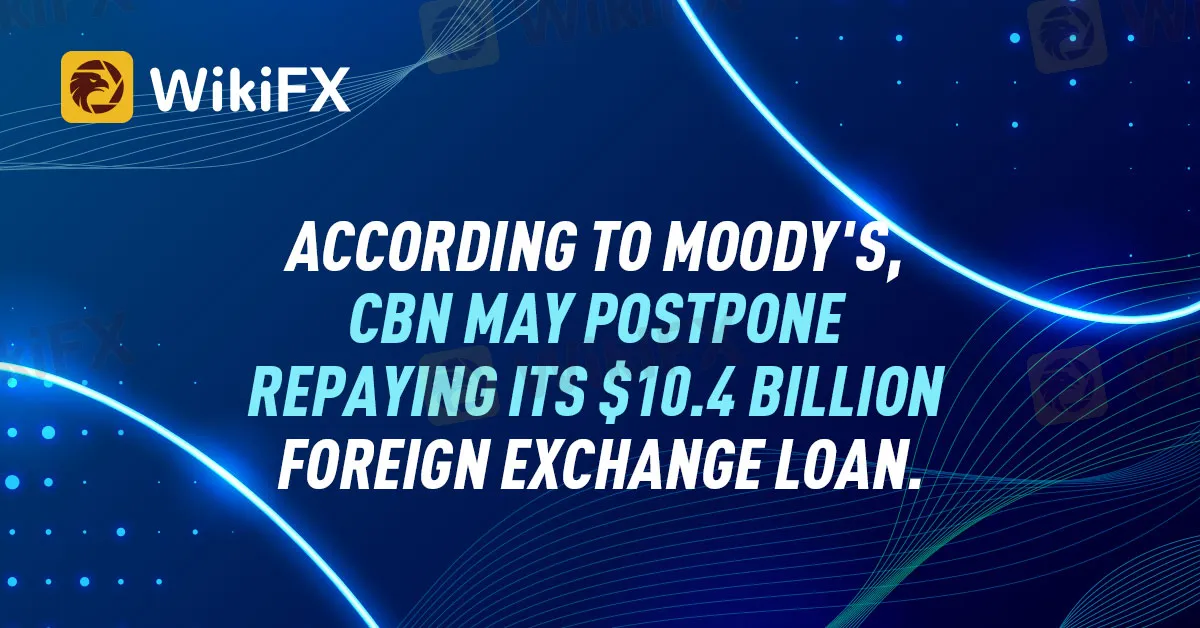简体中文
繁體中文
English
Pусский
日本語
ภาษาไทย
Tiếng Việt
Bahasa Indonesia
Español
हिन्दी
Filippiiniläinen
Français
Deutsch
Português
Türkçe
한국어
العربية
ACCORDING TO MOODY'S, CBN MAY POSTPONE REPAYING ITS $10.4 BILLION FOREIGN EXCHANGE LOAN.
Abstract:The CBN owes the banks money in the form of derivative transactions, which include swaps and forward contracts. In a loan, a certain quantity of money is given to another person in exchange for the value or main amount being repaid at a later date. In many circumstances, the lender increases by adding interest or finance charges, which the borrower must pay in addition to the original money collected.

The Central Bank of Nigeria's repayment of a total $10.4 billion in bank loans in foreign currency may take longer than anticipated.
The changes experience a dollar shortage that endangers lenders' liquidity and may eventually cause their capital to weaken.
If Nigeria decides to fully honor its dollar obligations and the payments would deplete over one-third of the continent's largest economy's foreign reserves and which as of February 14 totaled $36.8 billion.
According to Timchang Gwatau, at GCR Ratings, a Moody's affiliate, “the problem the report is addressing here is that there is a lot of foreign currency pressure here and there, and all that.”
The likelihood that it will occur is quite low, but if it does, banks' FX liquidity positions will undoubtedly be put under a lot of stress.
According to Moody's analysts Lynn Merhi and Mik Kabeya, the CBN owes the banks money in the form of derivative transactions that include forward contracts and swaps. Although the central bank has a record of paying back the FX it owes to the banks, there is a higher risk that it will extend some contracts and delay repayment now that there are severe foreign exchange shortages, according to a report from Moody's.
According to the rating agency, if the companies they provide with FX through trade finance go out of business, this might put pressure on lenders and make the liquidity problem worse.
For purposes relating to trade financing, Nigerian banks granted $9.8 billion in loans last year, making up more than half of the banks' liquid foreign exchange assets.
According to Moody's, “a major delay in repayment might put the banks in a position where they run out of their own foreign currency and limit their capacity to repay their own foreign currency commitments.”
Lenders provide trade finance services to businesses so they can import goods or conduct overseas business.
They must go through a process whereby they must apply to the CBN for foreign cash, which frequently takes some time and as a result, they frequently seek banks to satisfy their needs while they wait for the apex bank to issue the funds. The CBN transfers the funds to the banks so as to settle the exposure after providing them. At the end of the day, the banks will bear the brunt of it, according to Mr. Gwatau, since on the one hand, you made a pledge to a foreign counter party that if he doesn't deliver you your money by a certain date, I would give it to you.
Therefore, the bank will have to intervene if an import company defaults on its obligation. The bank is under pressure if the CBN also defaults or if it fails to provide the banks with their requested foreign exchange. The recipient is the bank in the end.

Disclaimer:
The views in this article only represent the author's personal views, and do not constitute investment advice on this platform. This platform does not guarantee the accuracy, completeness and timeliness of the information in the article, and will not be liable for any loss caused by the use of or reliance on the information in the article.
Read more

Top 10 Trading Indicators Every Forex Trader Should Know
Master the top 10 Forex trading indicators to analyze real-time Forex quotes, trends, and market signals. Learn strategies to boost accuracy and avoid mistakes.

WikiEXPO Global Expert Interview: Simone Martin—— Exploring Financial Regulation Change
In the midst of financial innovation and regulation, WikiGlobal, the organizer of WikiEXPO, stays abreast of industry trends and conducts a series of insightful and distinctive interviews on pivotal topics. We are delighted to have the privilege of inviting Simone Martin for an in-depth conversation this time.

MultiBank Group Wins Big at Traders Fair Hong Kong 2024
Discover how MultiBank Group, a global leader in financial derivatives, secured three prestigious awards at Traders Fair Hong Kong 2024, highlighting its innovative trading solutions and industry excellence.

CySEC Settles Compliance Case with Fxview Operator Charlgate Ltd
Discover how CySEC resolved compliance issues with Charlgate Ltd, the operator of Fxview, through a €50,000 settlement. Explore the investigation, regulatory measures, and CySEC's new website designed for improved accessibility and transparency.
WikiFX Broker
Latest News
Geopolitical Events: What They Are & Their Impact?
Volkswagen agrees deal to avoid Germany plant closures
Top 10 Trading Indicators Every Forex Trader Should Know
TradingView Launches Liquidity Analysis Tool DEX Screener
MultiBank Group Wins Big at Traders Fair Hong Kong 2024
WikiEXPO Global Expert Interview: Simone Martin—— Exploring Financial Regulation Change
'Young investors make investment decisions impulsively to keep up with current trends' FCA Reveals
Why Do You Feel Scared During Trade Execution?
CySEC Settles Compliance Case with Fxview Operator Charlgate Ltd
Malaysian Influencer Detained in Taiwan Over Alleged Role in Fraud Scheme
Currency Calculator


